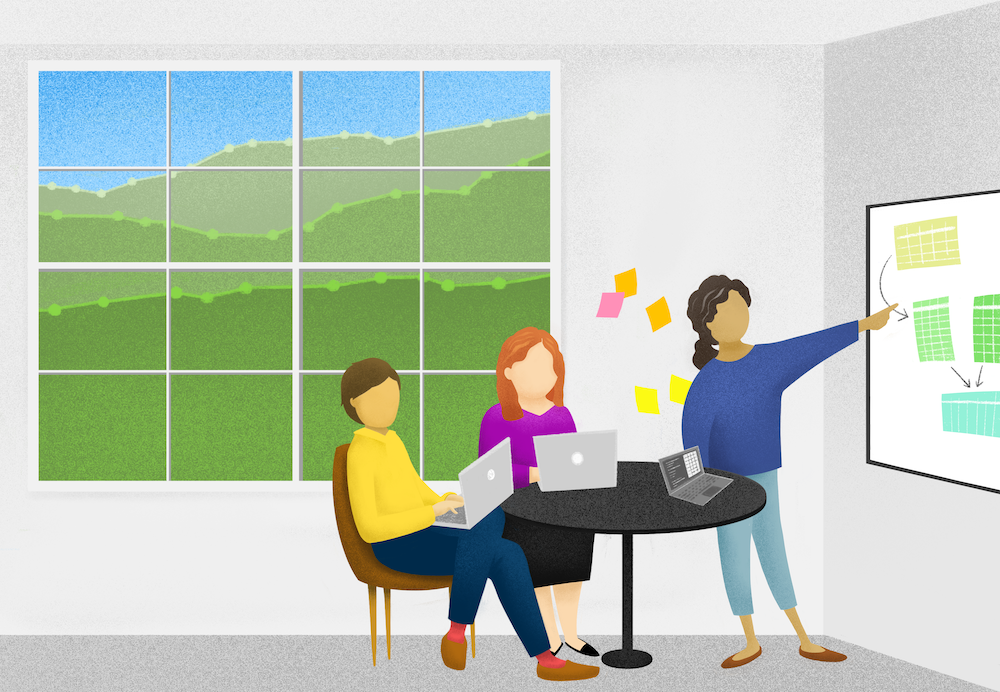Supercharging research with open data science and teamwork
Today we published a piece in Nature’s Career Column called Supercharge your research: A 10-week plan for open data science, and we are so thrilled to share this with the community. Co-authored with group leads from our inaugural Openscapes cohort – Halley Froehlich, Allison Horst, Nishad Jayasundara, Malin Pinsky, Adrian Stier, Nina Therkildsen, and Chelsea Wood – it really summarizes what we learned with the entire first cohort of Openscapes Champions and aims to welcome others to engage in open data science.

In the article, we describe how we were hesitant about engaging in open science, and how our perspective has changed because we started talking about it, along with our data challenges, in welcoming spaces. We are now enabling and supporting open data science in our research groups, and we share the following three main ideas:
- Normalize data discussions: talk about data with your research group and colleagues
- Identify and address shared needs: developing vocabulary around data challenges can help you find solutions and engage with the broader open data science community
- Think ahead for Future You and Future Us: always consider how to make it easier for others to understand and build from your work – especially when it is most likely to be you or someone in your research group.
And we also share 10 concrete activities to put these ideas into action with your research group — called A ten-week plan for open data science in the article. We are interested to see how this works for other groups, and to learn what you would add as suggested topics and resources for additional weeks! The manuscript is in this repository on GitHub – if you have other suggestions for activities beyond these 10 please write an issue or add a pull request with your ideas – or send us an email to openscapes @ nceas.ucsb.edu.
Openscapes updates and momentum
It has been busy since the last post about our keynote at the useR! conference.
My Mozilla Fellowship that supported the development of Openscapes ended in June; the fellowship was a truly transformational experience and I continue to be an active member of the Mozilla community (and I do plan to write a piece reflecting how those ten months of support, mentorship, friendship, and so many opportunities and ideas has enabled so much beyond what you see here with Openscapes). When the Fellowship ended I took three weeks in July off; although I loved everything I experienced and did, I really pushed myself hard and needed a break.
Since August I have been working on a strategic plan for Openscapes, including a vision for program sustainability and growth within and outside of environmental science. This has been possible due to generous support from the Gordon and Betty Moore Foundation, and continued institutional support from NCEAS, where Openscapes is a proud part of the Learning Hub. Learning from and discussing with many folks in the open, data science, and environmental communities, I am exploring different models to continue growing the Openscapes program, including offering opportunities to sponsor or book complete cohorts for the Champions program, which would be really powerful for networks of research groups already collaborating in similar areas. Please get in touch if you’re interested!
Meanwhile, we have been continuing to share the Openscapes story and perspective, which has led to a lot of interesting ideas that I’m excited to bring into the Openscapes lesson series and this website. Most recently I’ve been at several conferences — about building user- and community- friendly open data repositories with Dryad, open publishing platforms and incentives with FORCE11, and discussing community engagement and self-organizing systems at MozFest. This, along with continual learning and inspiration from the #rstats and open communities online, and locally through RLadiesSB, Eco-Data-Science, the Ocean Health Index, and NCEAS has given me a lot to think about and reflect upon. So there will be more coming soon!
Alongside these programmatic-level updates, what is truly the most awesome is that the Champions have continued the momentum around open data science even since accomplishments we shared when the cohort concluded in May – and they are also truly championing it. Labs are continuing discussions about data and research group culture, onboarding and teaching each other, and other ways to make life easier for Future Us, and sharing this open mindset with others.
A few examples:
- The Wood Lab now has a statement about open science on their website’s research page, and Danielle Claar gave a talk titled “Open source software advantages for science” at the Ocean Obs Conference. Also, Chelsea Wood published about using drone imagery to tackle ecological vectors for human disease
- Nina Therkildsen published about evolution in response to fishing
- Bart DiFiore and Adrian Stier published about coral reef ecosystems from space
- Malin Pinsky was selected as one of Science’s ten scientists to watch this year
- Nishad Jayasundara gave the convocation ceremony keynote at College of the Atlantic
- Allison Horst has added open practices to her data science & statistics courses for 100+ environmental science students, and kicked off another year of #TidyTuesday coding club
- Halley Froehlich became a new professor at UCSB and begins new collaborations with ‘where is the GitHub repo and what is the plan for the data?’ She has also testified about aquaculture on Capitol Hill and published about sustainable global food systems
Amazing, and these are just a handful of their accomplishments! In addition, I especially love seeing them connected through Twitter and IRL, amplifying each other’s research and ideas.
So excited about all of this, and all that is to come!